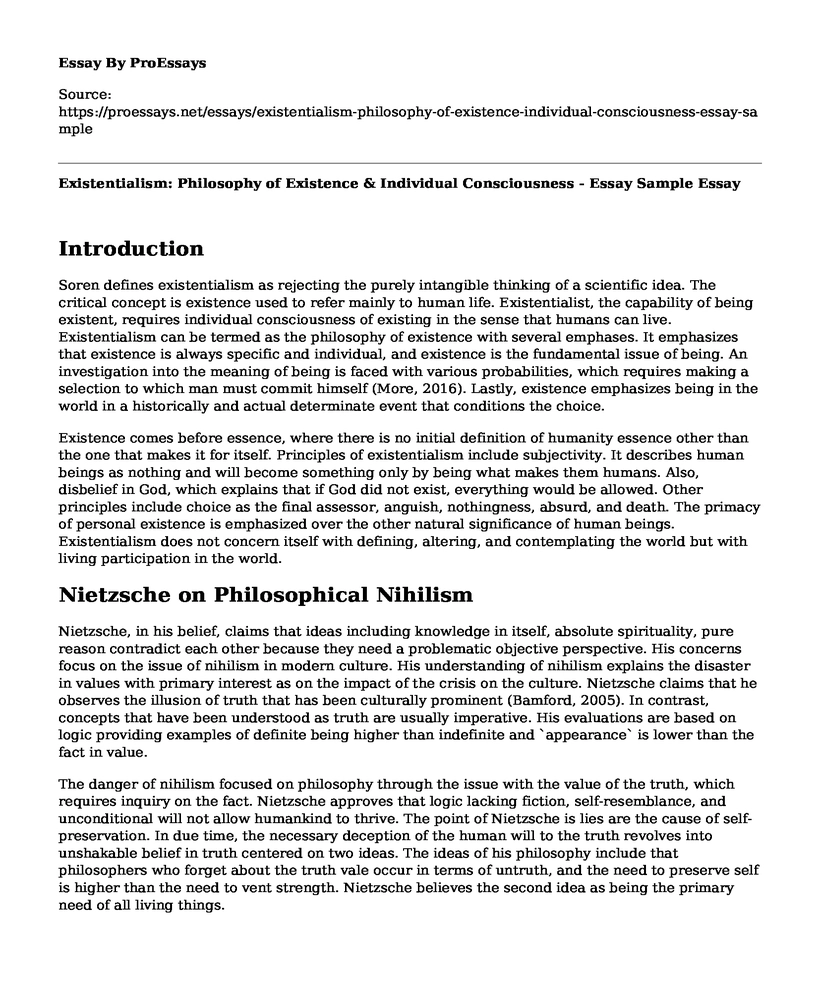Introduction
Soren defines existentialism as rejecting the purely intangible thinking of a scientific idea. The critical concept is existence used to refer mainly to human life. Existentialist, the capability of being existent, requires individual consciousness of existing in the sense that humans can live. Existentialism can be termed as the philosophy of existence with several emphases. It emphasizes that existence is always specific and individual, and existence is the fundamental issue of being. An investigation into the meaning of being is faced with various probabilities, which requires making a selection to which man must commit himself (More, 2016). Lastly, existence emphasizes being in the world in a historically and actual determinate event that conditions the choice.
Existence comes before essence, where there is no initial definition of humanity essence other than the one that makes it for itself. Principles of existentialism include subjectivity. It describes human beings as nothing and will become something only by being what makes them humans. Also, disbelief in God, which explains that if God did not exist, everything would be allowed. Other principles include choice as the final assessor, anguish, nothingness, absurd, and death. The primacy of personal existence is emphasized over the other natural significance of human beings. Existentialism does not concern itself with defining, altering, and contemplating the world but with living participation in the world.
Nietzsche on Philosophical Nihilism
Nietzsche, in his belief, claims that ideas including knowledge in itself, absolute spirituality, pure reason contradict each other because they need a problematic objective perspective. His concerns focus on the issue of nihilism in modern culture. His understanding of nihilism explains the disaster in values with primary interest as on the impact of the crisis on the culture. Nietzsche claims that he observes the illusion of truth that has been culturally prominent (Bamford, 2005). In contrast, concepts that have been understood as truth are usually imperative. His evaluations are based on logic providing examples of definite being higher than indefinite and `appearance` is lower than the fact in value.
The danger of nihilism focused on philosophy through the issue with the value of the truth, which requires inquiry on the fact. Nietzsche approves that logic lacking fiction, self-resemblance, and unconditional will not allow humankind to thrive. The point of Nietzsche is lies are the cause of self-preservation. In due time, the necessary deception of the human will to the truth revolves into unshakable belief in truth centered on two ideas. The ideas of his philosophy include that philosophers who forget about the truth vale occur in terms of untruth, and the need to preserve self is higher than the need to vent strength. Nietzsche believes the second idea as being the primary need of all living things.
References
Bamford, R. (2005). Nietzsche, science, and philosophical nihilism. South African Journal of Philosophy, 24(4), 241-259.
More, V. (2016, November 15). Existentialism: A philosophic standpoint to existence over essence. Retrieved from https://www.researchgate.net/publication/310264700
Cite this page
Existentialism: Philosophy of Existence & Individual Consciousness - Essay Sample. (2023, Mar 16). Retrieved from https://proessays.net/essays/existentialism-philosophy-of-existence-individual-consciousness-essay-sample
If you are the original author of this essay and no longer wish to have it published on the ProEssays website, please click below to request its removal:
- Business Ethics Research
- What Inspires a Man to Seek to Do Good Instead of Evil? Paper Example
- The 7 Habits of Highly Effective People Essay Example
- Essay Example on Mom Teaches Daughter Life-Lessons: Benefits of Moral Values
- Essay on Four Mexican Teens Pursuing American Dream: A Joshua Davis Story
- Essay Example on Plato: Father of Western Philosophy & Redefining Virtues
- Essay Example on Are Humans Naturally Good or Bad?







